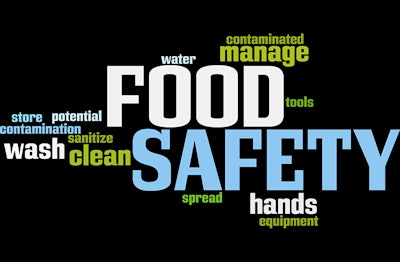
More than half of European consumers have a high level of awareness of food safety topics, and two-thirds have changed their behavior as the consequence of receiving information on food safety risks, according to a new survey.
Approximately four out of 10 consumers in the European Union are interested in food safety, according to the latest Eurobarometer survey carried out for the European Food Safety Authority (EFSA). For those in Cyprus, Finland, Luxembourg and France, that figure was at least six out of 10. At the lower end was Italy, where fewer than two in 10 respondents said the issue was important to them in making purchasing decisions.
Four out of 5 of those surveyed said they consider food safety alongside price, taste, nutrition and origin when choosing food.
Across the EU, origin was the most important single criterion (53%), followed by cost (51%), food safety (50%), taste (49%) and nutrient content (44%). At 19%, “ethics and beliefs,” a category that includes animal welfare, emerged as a much lower priority for the consumers overall.
Citizens of countries giving the top priority to food safety were Cyprus, Malta, Croatia, Greece, Slovakia and Romania.
In contrast, “ethics and beliefs,” was the third most important criterion given by those surveyed in Sweden (47%), and also highly valued in Denmark, Germany, and Austria. It received the lowest scores in Croatia and Latvia.
Two-thirds of the survey respondents said they had changed their consumption behavior as the result of information on a food safety risk. While half of them soon returned to their previous habits, the other 50% said they had made those changes permanent.
Variation in top priority food safety concerns
Overall across the EU, the food safety aspects most frequently causing concern to consumers were the misuse of antibiotics, hormones and steroids in farm animals (44%), pesticide residues in food (39%) and food additives (36%).
The topic of greatest concern showed some variation between EU states.
Those surveyed in Cyprus, Greece, Portugal, the Czech Republic and Slovakia were most worried about diseases found in animals, while those in Denmark and the United Kingdom were most likely to mention food hygiene.
Comparing the results with a similar survey carried out in 2010, consumers now seem to be less concerned about genetically modified organisms (GMOs). By contrast, micro-plastics were mentioned for the first time.
Scientists, social media increasingly influential
This Eurobarometer survey revealed that on food safety matters, scientists were the group most trusted by consumers, and the level of that trust was higher than in the previous survey in 2010. Consumer organizations and farmers also scored highly.
As in 2010, television remains the main source of information on food safety for seven out of 10 Europeans. This is now followed by the internet (excluding social media); newspapers and magazines; and family, friends and neighbors.
Unsurprisingly, social media have become an important source of information on food safety for younger consumers (15-24 years), while older people continue to rely on television, newspaper and radio for their food safety messages.
Future direction for EU food safety
Commenting on the results of the latest Eurobarometer survey, Commissioner for Health and Food Safety, Vytenis Andriukaitis, recognized the valuable work that has been done by all those in the food chain — including farmers and veterinarians — to make food safe.
“This gives us even greater motivation to continue our work in ensuring that our high standards are maintained, and also strive to achieve more sustainable production and consumption patterns,” he said.
“It is reassuring to see that Europeans are not overly concerned about the food on their plates,” said EFSA Director Bernhard Url. “I believe this is not by coincidence but rather thanks to advances in science and technology, which have helped to improve food standards and hygiene practices.”
EFSA and the European Commission will likely focus at least some of their future efforts on explaining to the public how the EU food safety system works. Just 19% of the survey respondents were aware that the EU has a separate institution that provides scientific advice on the safety of food.
The first World Food Safety Day was celebrated on June 7, with the aims to raise public awareness of food safety and to reduce the burden of foodborne diseases. As well as EFSA, the initiative was supported by the United Nations’ food and health bodies — World Health Organization, Food and Agriculture Organization and Codex Alimentarius — as well as the International Poultry Council.

















